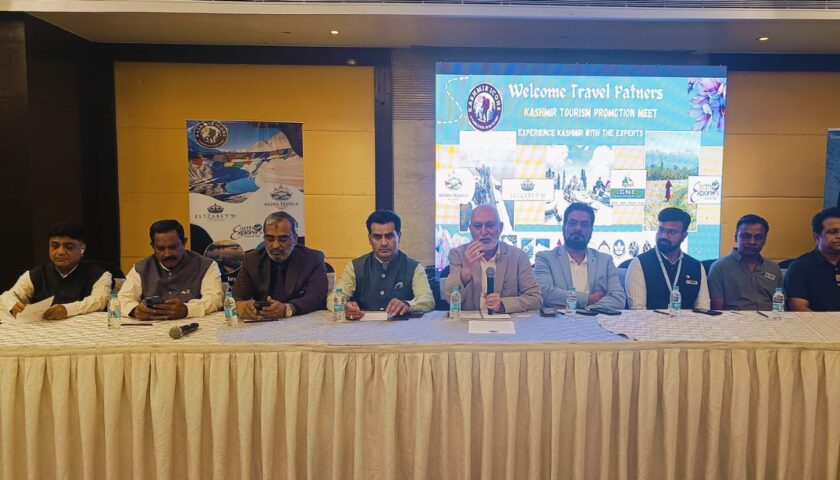The Silent Suffering: Kashmiri Vendors Caught in Uncertainty
Srinagar 30 April 2025: For decades, Kashmiri shawl vendors have traveled across India, setting up stalls and selling their exquisite handcrafted shawls, carpets, and traditional garments. Their trade has woven a connection between the vibrant culture of Kashmir and the rest of the country, sustaining generations of families dependent on this seasonal business.
However, recent incidents of harassment, discrimination, and forced evictions have left many Kashmiri vendors stranded, unsure about their future. The economic challenges they face, compounded by misinformation and growing tensions, threaten their only source of livelihood.
Why should we support Kashmiri vendors?
- Preserving Kashmir’s centuries-old craftsmanship
- Empowering small businesses & artisans
- Preventing economic hardships faced by displaced workers
- Building bridges through cultural exchange
A Life Built on Seasonal Trade: The Harsh Reality for Vendors
For shawl sellers, Mussoorie, Dehradun, and other hill stations have been seasonal homes for decades. Many leave Kashmir during the harsh winter months, traveling to cities where tourism is booming, selling their handcrafted goods, and returning home with enough earnings to support their families.
But recently, their peaceful existence has been shattered by rising hostility in certain areas.
The impact on Kashmiri vendors due to displacement:
- Loss of business: Forced departures mean abandoned stock & wasted investments.
- Financial instability: No earnings mean extreme economic hardship for their families.
- Emotional distress: Fear of discrimination and uncertainty about their future.
The Human Side of the Story: Vendors Speak Out
“We have been coming to Mussoorie for years. This is our livelihood. If we leave, we lose everything,” shares a vendor who had to abandon his stall due to rising tensions.
“Our fathers were once vendors here, and they never faced these issues. Now, suddenly, we are being asked to leave,” says another seller, reflecting on past years of harmony.
“We left behind goods worth lakhs. How can we recover from this loss?” laments a Kashmiri trader, highlighting the financial burden of sudden displacement.
Discrimination based on identity hurts thousands of small-scale workers who rely on their businesses for survival. A loss in tourism sales affects not only vendors but also the communities they serve.
How We Can Help: Supporting Kashmiri Vendors & Small Businesses
While challenges persist, there are ways individuals and communities can stand in support of Kashmiri artisans and vendors:
- Buy authentic Kashmiri products – Shawls, carpets, saffron, and papier-mâché art.
- Promote ethical trade – Support verified Kashmiri-owned businesses online.
- Raise awareness – Share stories that highlight the struggles and resilience of vendors.
- Encourage fair treatment – Businesses & communities must ensure non-discrimination.
“Catch the perpetrators, not us,” was a vendor’s plea, reinforcing the need for justice, fair trade, and human dignity.
The Bigger Picture: Tourism, Trade & Cultural Harmony
Kashmiri artisans bring cultural richness, diversity, and an unparalleled level of craftsmanship to the Indian marketplace. Tourists from across the country seek their handmade treasures, and their seasonal trade bridges connections between Kashmir and the rest of India.
Supporting small vendors ensures that local economies thrive, tourism flourishes, and cultural heritage remains strong.
- Ending Discrimination & Promoting Inclusivity
- Fair legal policies to prevent wrongful evictions
- Strict action against hate-driven displacement
- Better community relationships between vendors & locals
Final Thoughts – Standing Up for Small Businesses & Human Rights
Every vendor, artisan, and craftsman deserves respect, safety, and fair opportunities to earn a livelihood. While economic hardships, discrimination, and misinformation pose challenges, collective support can empower displaced vendors and preserve Kashmir’s rich cultural and artistic legacy.
It’s time to stand up for those who bring tradition, craftsmanship, and history to our markets. Let’s ensure that Kashmiri vendors can trade without fear, travel without discrimination, and thrive in harmony with communities across India.




